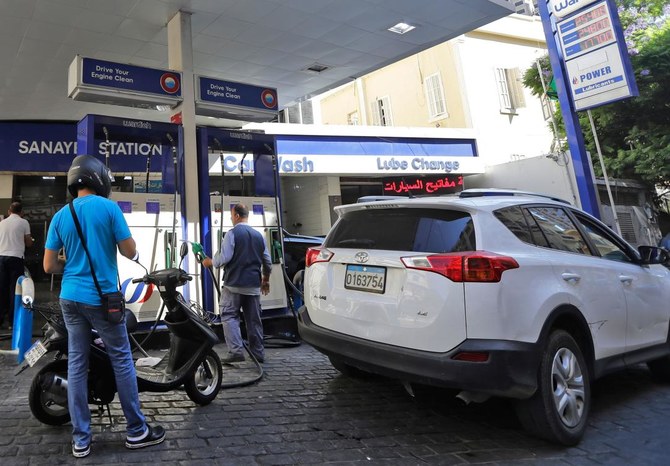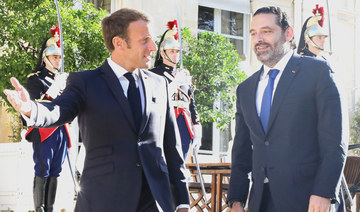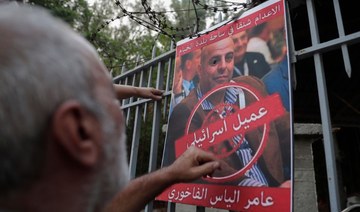BEIRUT: Petrol station owners in Lebanon on Friday suspended a strike and said they reached a deal with the government allowing them to pay suppliers in Lebanese pounds, following complaints over a shortage in dollars.
The Syndicate of Gas Station Owners on Thursday night had announced an open-ended strike, saying banks were not supplying them with the dollars needed to pay importers and suppliers because of a shortage in reserves.
Lebanon was thrown into confusion overnight on Friday as some petrol stations turned off their pumps — the second time that drivers have been unable to refuel their vehicles in less than two weeks.
The fuel “shortage” arrived against the backdrop of a social media campaign calling for the removal from office of the governor of Lebanon’s Central Bank, Riad Salameh, as a result of Lebanese banks’ continued abstention from securing liquidity in dollars for those who do not have dollar-based accounts, and limiting the amount of funds available for withdrawal through ATMs.
These moves have allowed traders to control the exchange rate of available dollars, increasing the rate in some regions to more than LBP1,600. The official rate is LBP1,507.
A source at the central bank told Arab News that the bank’s decisions had been triggered by unusual patterns of dollar withdrawals in “many Lebanese areas within a limited period of time,” claiming that up to 20 times the normal daily rates were withdrawn, “confusing the banks.”
“Through a comprehensive audit by the Central Bank, it was found that these funds were in dollars and that they arrived in Syria, Turkey and Iran, which are experiencing severe economic crises,” the source said.
“These mafia-like operations led to questioning, especially as they were carried out during US sanctions on Hezbollah, Syria and Iran. These dollar withdrawals were also accompanied by a sell-off of the dollar drawn from banks on the black market, specifically to money exchangers at high prices for profits.
“The demand for the dollar cannot be the result of economic activity,” the source said. “The amounts offered by banks have been the same for a long time, which means that there has been an unjustified use of the dollar, which is not related to increased imports — in light of the economic downturn in Lebanon.”
This situation caused chaos in the markets as traders refused to deal the Lebanese pound and offered prices in dollars. This affected the cost of fuel, leading some owners to close their gas stations in protest — despite Prime Minister Saad Hariri’s promises last week to representatives of the fuel sector and its unions to find ways out of the crisis by opening credit lines for companies that import fuel.
The head of the gas and exploration sector union in Lebanon, Maroun Al-Khouli, said: “The threat of some gas station owners of an open strike is unacceptable and is similar to the practice of banditry. It violates the decision of the oil sector coalition to allow for the time needed to find a solution.”
On Thursday night, there was a rush on gas stations as rumors of protests began circulating on social media, accompanied by footage of road closures and protestors calling for the government to be overthrown. However, the Traffic Management Center claimed that the footage was old and denied the rumors.
Banque du Liban governor Salameh has promised to regulate the import of crucial materials including wheat, medicine and fuel. Meanwhile, President Michel Aoun, who returned from New York on Friday, spoke to reporters of “some pressure on Lebanon, which is not new.” He called for “deliberation before adopting any position and until the truth is clear, especially with regard to the dollar crisis.” However, he also said he did not know what had happened in Lebanon while he was in New York.
MP Hadi Abul Hassan said that the cause of the dollar crisis is “a deliberate operation to increase financial, economic and political pressure on Lebanon through an internal network that is trying to withdraw the dollar from banks and smuggle it into Syria, but the real purpose of this matter is unknown.”
He called on the Lebanese state to “move quickly to put an end to the problem of illegal crossings.”
Former MP Fares Souaid blamed Hezbollah for the deteriorating economic situation. “It is preventing investment because of its weapons, trying to get Lebanon out of its Arabism and putting us in the space of Iran. It has taken us hostage in the face of the world and wants to convince us that it is the fault of Riad Salameh, the banks, Syrian refugees and gas stations.”




























